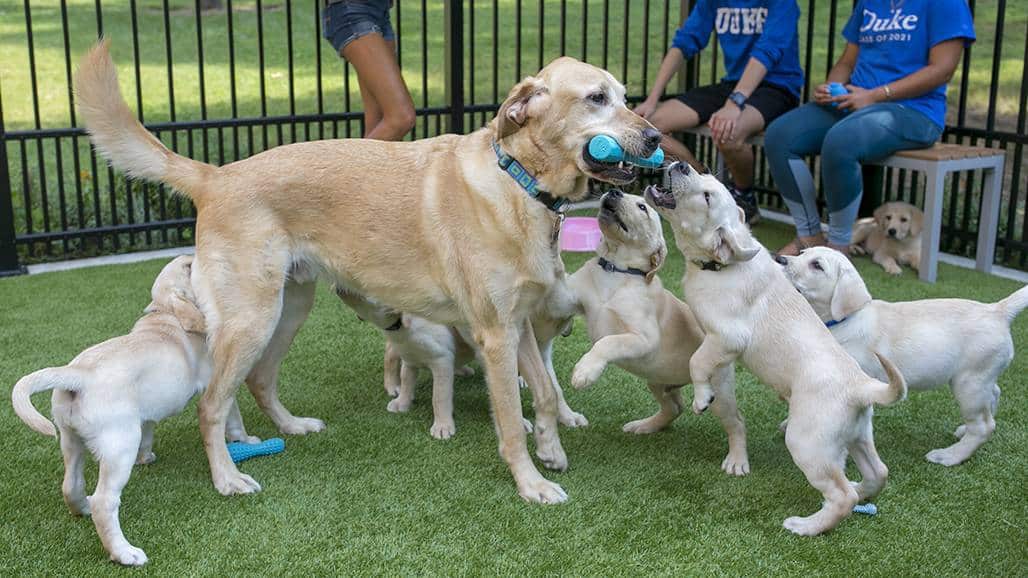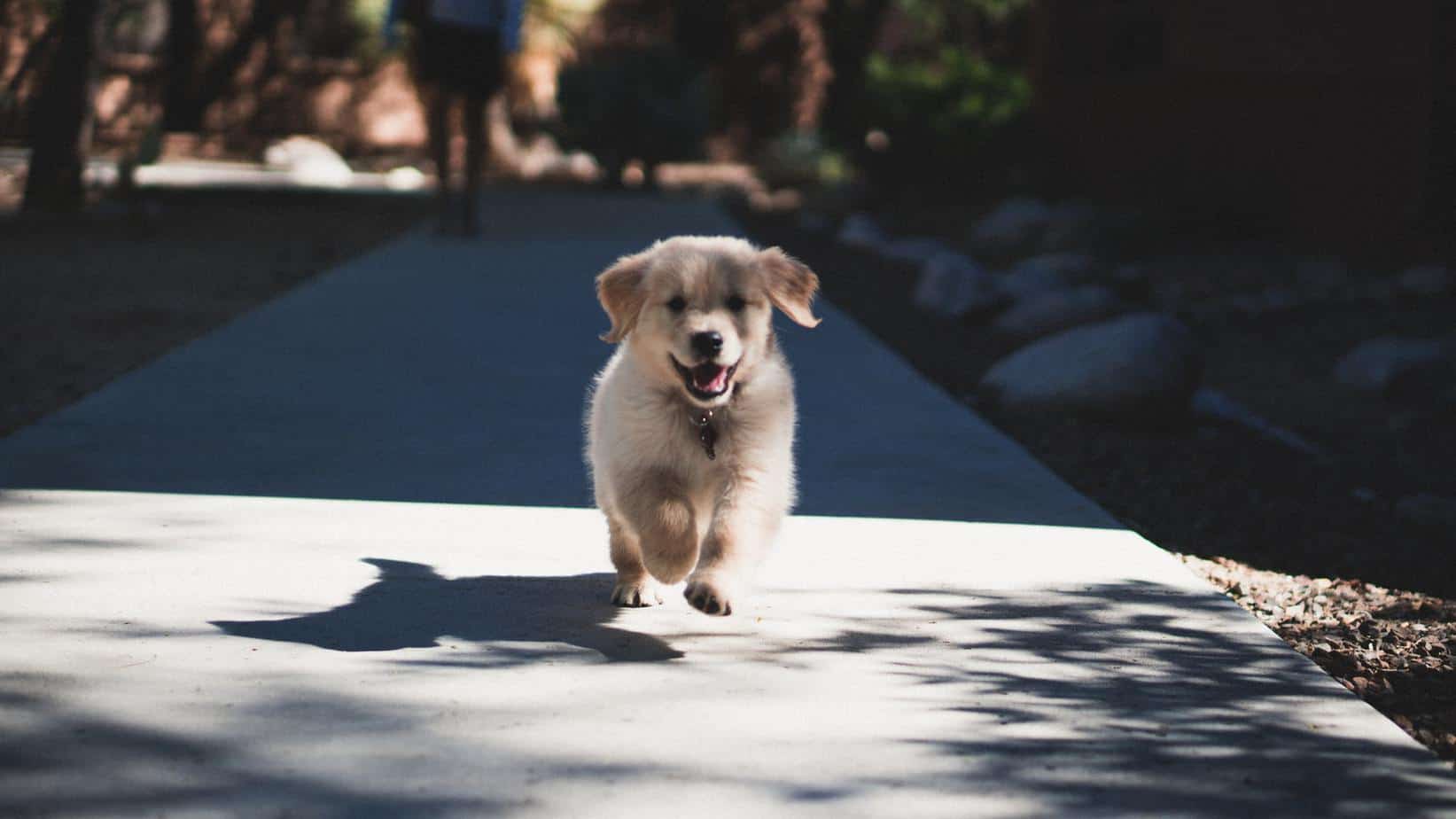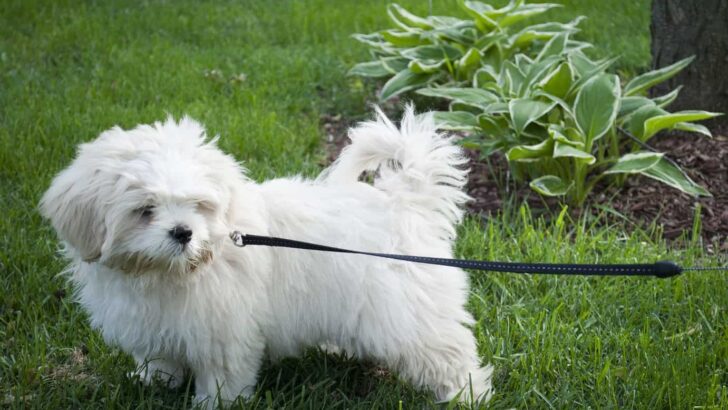- Nom Nom Dog Food Subscription Review - November 7, 2023
- 7 Best Dog Bed Ideas For Great Dane (DIY Options) - July 16, 2022
- Top 5 Rated Best Non-Prescription Diabetic Dog Food - July 15, 2022
As a new pet parent, training your new puppy should be one of the top things on your list of dog-related activities. Socialization, good manners, and obedience training are essential for all puppies and will nip any future behavior problems before they take root. As importantly, spending time with your puppy to train them will give you a better understanding of their personality and reinforce your bond.
Attending a puppy kindergarten together is one way of doing this, and the class will also prepare your puppy for interactions with the larger world. You can generally start a puppy class when your pup is about 8 to 12 weeks old. Puppies of this age will have learned bite inhibition and will get along better with their classmates.
To find a puppy kindergarten in your area, you can ask pet-owning friends and neighbors or your veterinarian for recommendations, and also check class listings online. Research the classes well before enrolling your pup. Find out who is taking the class and how many puppies will be included in each class. Find out about their training methods, if they train with a clicker or treats or both. Find out what their enrollment requirements are.
If you are too busy to attend an actual class in person with your pup, there are other options for training your dog. You can attend an online puppy class, join an online training group, read books and articles on dog training, use dog training virtual apps, and watch videos on dog training.
Why Puppy Kindergarten Is Good for Your Dog

Many dog training instructors believe that one of the first things puppies should learn is self-control. This means waiting until it is their turn to be petted or given treats. Once this behavior trait is well-instilled, it will be easier for the pup to pay attention and pick up other commands in a puppy kindergarten class.
A puppy kindergarten class will give your pup basic training in obedience and good manners. Your dog will learn essential commands like pay attention, sit, down, stay, come, walk, heel, speak, be quiet, hold it, drop it, leave it, fetch it, and so on. The training class will address issues like house-training, leash walking, barking, chewing, nipping, jumping, and any other problematic behavior that your dog might have.
By interacting with other puppies of about the same age over a period of several days or weeks in the puppy class, your pup will learn important socialization skills that every dog needs to know.
Your pup will learn targeting behavior in the training class. This includes touching specific objects with the dog’s nose, paws, or whole body. This is useful for training the dog to do things like ringing a bell, pressing a button, knocking on a door, or staying put on a rug. The class will also train your pup in husbandry behavior. This includes crate training as well as becoming accustomed to bathing, brushing, nail clipping, teeth examination, body examination, and other assorted things. This will significantly reduce your dog’s anxiety at home, at the veterinary clinic, and at other public places.
The puppy class will teach your dog to respond to treats and to play with a variety of mentally stimulating toys. Playing games together is a fun way of strengthening your relationship with your pup.
Why Puppy Kindergarten Is Good for YOU
The training class will help you to gain an insight into animal behavior in general and your pup’s behavior in particular.
By attending a puppy kindergarten class and training together with your pup, you will understand how to communicate better with your puppy. This is extremely important and something you don’t want to miss if you are a first-time puppy owner. Puppies need gentle handling and positive reinforcement in order to thrive, and by accustoming them to this treatment from an early age, you will have a relaxed, well-balanced canine companion.
Working in an obedience training class with your pup will give you a good understanding of what you need to do and what you need to avoid doing in order to become a better pet parent to your dog. Teaching puppies to respect you and listen to you, for instance, rather than have them disregard you unless you have treats with you; you don’t want to have to bribe your dog every time you want them to do something.
You will learn to be a leader, rather than a boss, to your dog. Dogs prefer leaders that are calm, considerate, and firm, and these are important life skills for anyone to have; they transfer well to the human sphere as well.
As you attend puppy socialization and obedience training class together, you will understand how exactly your puppy learns, in what steps, and at what speed, and you can adjust the training to better fit their individual needs. You will find that you are developing a closer bond with your pup too as you work together to learn new commands.
With proper leash and socialization training, you will have a well-behaved, socially acclimatized dog that will be a pleasure to have around.
How To Find the Right Puppy Kindergarten
Search online for puppy training class listings in your area. Look up information on type of class, type of training offered, and age of puppies that are trained.
Are there well-behaved dogs in your neighborhood? Talk to their owners and ask if they have attended training classes with their dog, and if they can recommend any for your pup. Ask your veterinarian if they can recommend an appropriate training class for your pup. Local pet supply stores often conduct dog training classes, so inquire at your local one, or ask them if they know of any training classes being organized in the area.
Once you have found a puppy kindergarten in your area, find out who the instructors are and what their training qualifications and prior experiences in dog training are. If possible, ask people who have taken a class with a particular dog trainer for their experiences with them. Talk to pet owners who have attended the training class you want to take with your pup, and find out what you can reasonably expect there.
Find out if there will be a group class or if your dog will receive individual training. If it’s the former, inquire about the number of puppies in each class, and if they are around the same age as your pup. If there are dogs of disparate ages, it might get overwhelming for your inexperienced puppy. Also, training with a crowd may not get your dog the particular attention they need.
Find out what kind of training the puppy kindergarten will be providing. Will the class cover basic manners, socialization, and leash training? Will your dog get the right behavior input with clicker training or with treats? Are the training methods flexible to accommodate your dog’s individual temperament and training requirements?
Find out the duration of the puppy class. Will it be a matter of days or weeks? Does the dog training class have a specified number of sessions? Can you extend these if your pup needs more training? Do you have to train with your pup on site for the class, or are there any home training options for a dog that is shy , fearful, or has other severe behavioral issues?
Inquire about the total cost of the dog training class, and the class supplies that you will need for training your pup. Make a list – dog leash, collar, toys, treats, etc.
Has your puppy received the vaccinations needed for a pup of that age? Vaccination is often mandatory in a training class to protect the enrolled puppies from communicable diseases. If your puppy is still to be inoculated, schedule a visit with your veterinarian before attending a puppy class.
What Are Your Options If There Is No Puppy Kindergarten Near You?

1. Online Classes
There are some excellent dog training classes online, offering either free or paid instruction that can cover basic leash and socialization behavior, and much more. If your schedule or geographical location rules out attending an actual class, you should definitely check these out. As with an offline class, you should research who the dog trainers are, what they are going to be teaching, how they are going to teach it, and how much they are going to charge for the puppy class. This can be easily done by browsing through their website.
Since the training is virtual, you should inquire if they offer one to one video training sessions, and find out how available they are if you should happen to want any additional advice regarding your pup. Most successful trainers are busy people, so remember to be respectful of their time.
Along with conducting training classes, many of these trainers offer a great deal of useful information via articles and videos on their websites. Some are also published authors with books on dog training. Be sure to take your time and go through the following links in detail –
Ian Dunbar – Sirius Dog Training
Suzanne Clothier – Relationship Centered Training
Karen Pryor – Clicker Training
Patricia McConnell – Dog’s Best Friend Training
Kathy Dao – Bright Spot Dog Training
Other informative sites –
Cyber Dog Online – Homeschooling for Hounds
2. Virtual Training Apps
The great thing about virtual dog training apps is that, unlike with an actual class, you can avail of them at any time on your mobile device. So, if you happen to be out and have a few moments in which to train your pup, you can look up information quickly and use it. There are android, iOS, web, and desktop apps, and you can download the ones that best suit you. Here are some links to check out –
Puppy Coach 101, By Grazioso Pictures Inc
Pooch – your personal dog trainer, By Pooch Inc.
Puptimize – Dog training made easy, By Puptimize
Puddle & Pile – Puppy Toilet Training, By Manser Services
iClicker – Free Dog Training Clicker, By Savvy Appz
Dog Tricks & Bark Machine, By Pocket Cocktails Inc.
Cliker dog training, By scopeapps2
Pro Plan P5 Dog Training App, By Nestle Purina PetCare
3. Dog Training Books
Whether you are attending a puppy class or not, books and articles written by dog training experts can be invaluable in working with your dog. Classes may have limited time and training options, while books can give you in depth tips on how to handle puppies of different age groups and temperaments, how to understand dog behavior, and how to train your pup in everything from walking on a leash to performing more complex tasks. Even if you are a completely new pet parent with no prior experience of dogs, you will get good information by reading about dog training and psychology. Here are some books and article sites that you might find useful –
The Dog Vinci Code: Unlock the Secrets to Training Your Dog, By John Rogerson
Training the Best Dog Ever: A 5-Week Program Using the Power of Positive Reinforcement, By Larry Kay
The Puppy Primer Paperback, By Patricia B. McConnell and Brenda Scidmore
On Talking Terms With Dogs Calming Signals Paperback, By Turid Rugaas
The Other End of the Leash: Why We Do What We Do Around Dogs Paperback, By Patricia B. McConnell
4. Dog Training Forums and Groups
If attending a puppy class is out of the question, consider joining a dog training forum or group on Facebook, Google Plus, Yahoo, and other sites. These can be interesting and informative places as dog owners from diverse backgrounds converge here to talk about their experiences, to post photos and videos, to give advice, to ask for advice, and so on. Many group members have a vast amount of knowledge about dog behavior and many are experienced dog trainers. Some may even conduct actual or virtual classes. You and your pup can benefit from their expertise. Here are some of the top groups –
5. Dog Training Videos
Watching training videos posted by dog owners, dog trainers, and dog experts on YouTube, Vimeo, and other sites can be as helpful as attending a class. You will pick up pointers on dog behavior by seeing how a pup of about the same age as yours is being trained. Let’s look at some of the top dog training videos –
Pam’s Dog Academy – Pamela Johnson
Get Training with Your Pup
Attending an actual puppy class at a puppy kindergarten near you can be a fun and convenient way to train your pup, but, if not, as shown above, there are plenty of options for training both you and your puppy. You should avail of them even if you are attending a class. The more you know about dog behavior and socialization, the easier it will be for you to raise a canine good citizen with excellent manners. Oftentimes it takes more than one approach to get things right, and what works for some dogs may not work for others. Do consider advice from a well-meaning dog trainer, but don’t let your intuition about your dog take a backseat. The key in training success is to understand your dog’s personality and to incorporate various methods that are right for them.
Continue reading:




